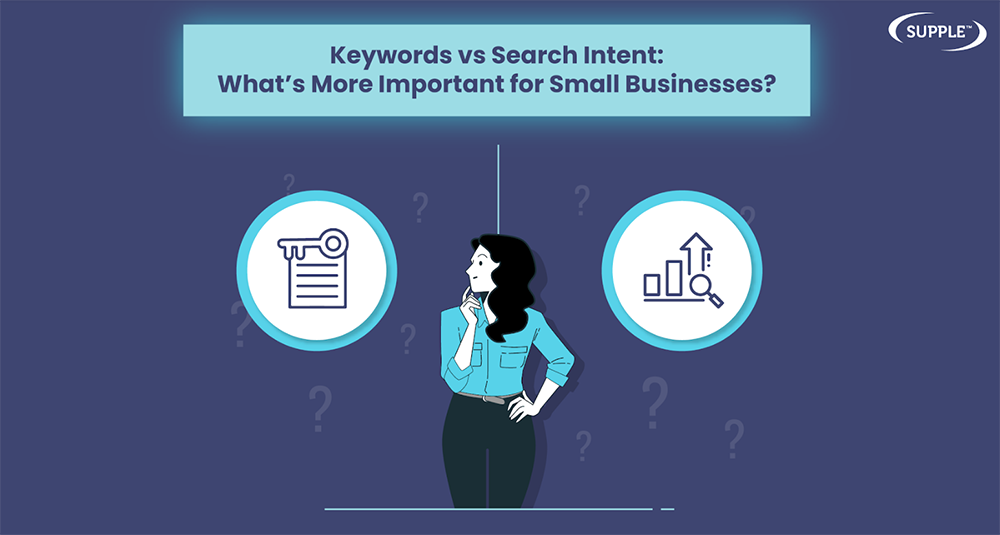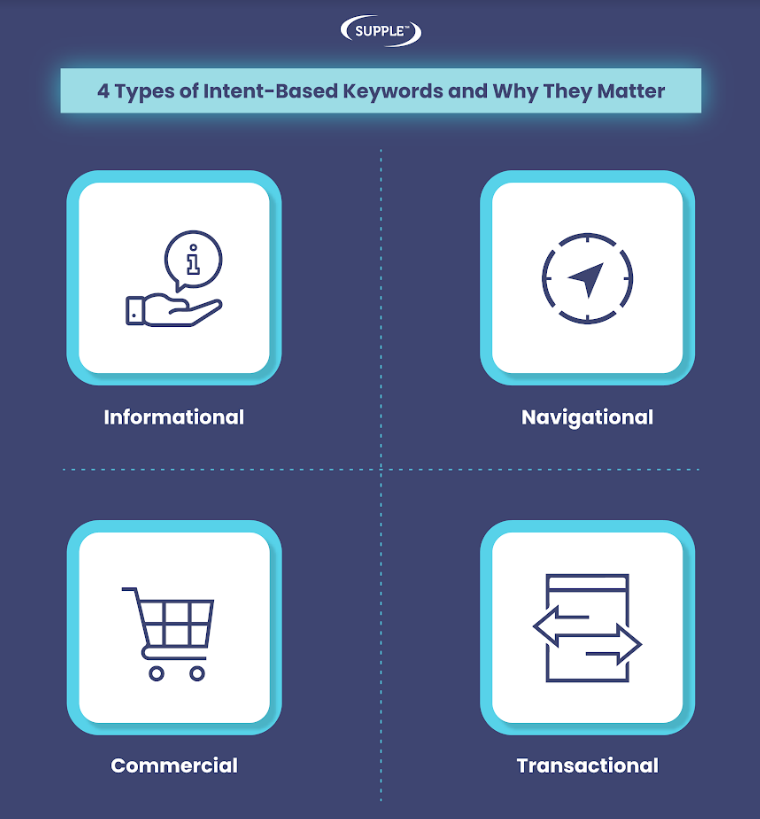5 Steps to Identify Target SEO Keywords for Small Businesses
Keywords have remained a consistent part of digital marketing and SEO. They have been extensively used by small businesses to optimise their website or content for search engines.
Small business owners like you who aspire to get ahead in search engine result pages (SERP) need to understand the space is already stacked with competition. Due to that, it is becoming hard to stick up to your bigger counterparts.
The biggest issue you might face is finding and targeting the right SEO keywords for small businesses to help you improve your ranking. However, with diligent research and a proper mindset, you can easily discover the right keywords for small businesses to optimise your website.In this article, we are going to look through the multiple facets of keyword research from different types to elements, and steps for small business keyword research. So, without further delay, let’s get started.
Keywords vs Search Intent: What’s More Important for Small Businesses?
There are a gazillion searches performed on Google each day to find products, services, information, content, and shop items online. Search engines are today’s phonebook for users and equivalent to Yellow Pages for businesses.
Keywords are the only currency that search engines accept to help users find the desired information online. These keywords allow you to improve your website’s relevancy to appear higher for the correct search terms and outrank your competitors.
Keywords are nothing but search terms that users write in the search bar of Google or other search engines. Businesses of all sizes can leverage these search terms to optimise their site for SEO.
Today, keywords have come a long way from only being a keyword to intent-based terms. Search engines have grown to understand the intent behind keywords entered by users and present the results as accurately as possible.
Therefore, one needs to analyse and identify SEO keywords for small businesses with the right intent to optimise their website and content. This could be achieved by classifying the keywords into four different categories based on the intent they serve.
4 Types of Intent-based Keywords and Why They Matter
Each of the keywords for small businesses has a deeper intent behind them which makes it mandatory to implement the intent-based strategy. Intent-based keyword research starts with classifying keywords into four categories.
Let’s see what these intent-based keywords would look like.
Informational: Users perform informational searches when they are looking for specific data or information about a product, service, brand or a particular subject. Here, searchers have the intent to get answers to their questions or queries.
These keyword types have a higher search volume but don’t bring much conversions as the only goal here is to get information. They usually start with words like “What”, “How”, and others, making them easily distinguishable from other keyword types.
E.g.,
- What is SEO?
- What is Keyword Research?
- What is Search Intent?
Navigational: These types of search terms have the intent of finding a brand, company, or location. Users performing navigational searches already know the company and what it offers but want to find its official website or location to get services from them.
These keyword types can increase the organic traffic for your business.
E.g.,
- Supple
- Gmail Login
Commercial: Commercial keywords reveal the searcher’s intent about a specific product or service. Typically, searchers use these keywords when they want more with a product or service they plan to purchase from your eCommerce platform.
They may want to check out the features, compare them with other products, or check prices or discounts. Thus, they are ideally used in listicles, comparison articles, how-to guides, and review articles to provide you with valuable opportunities to reach the target audience.
E.g.,
- Apple vs Android
- iPhone 14 vs iPhone 13
- iPhone 14 reviews
Transactional: These types of keywords have a strong transactional intent to purchase the items. Searchers use these types of keywords when they want to take an imminent action and get involved with your brand.
These SEO keywords for small businesses should be utilised for high-converting sales pages or on targeted PPC ads. Such types of searches happen when the users are adorned with sufficient information and are planning to move ahead with purchase.
E.g.,
- Best SEO agency
- Top restaurants for dine-in
- Best SEO Tools for Small Businesses
Elements of Small Businesses Keyword Research
When conducting small business keyword research, there are three key elements to pay attention to. Let’s see what they are:
1. Relevancy
Since we have understood the importance of intent in a keyword, relevancy is also a major factor search engines consider when ranking a page for a keyword. The relevancy of a keyword defines whether your website meets searchers’ intent or not.
Additionally, you want to make sure the content of your small business website provides searchers with precise information they are looking for. After all, Google only wants to rank the content that’s the best and helpful resource for the searchers.
And the only way for Google to rank your content or the web page at the top is to make it as relevant as possible by including the common terms users search.
2. Authority
Another factor to keep in mind while conducting small business keyword research is authority. Google will only rank websites that it deems authoritative based on several factors. And if your page or domain isn’t authoritative, it has fewer chances of appearing on the top of SERP.
Thus, focus on enhancing the authority in the eyes of Google for the keywords used on your content pages. You can achieve the same by earning social links and backlinks from authoritative sources.
3. Volume
The third most important element of keyword research is measuring the monthly search volume (MSV). MSV means how many times a keyword is used by searchers in a month, which gives you an idea how significant the said keyword is.
If a keyword has a zero search volume, generating traffic and engagement from the same would be hard even if it ranks at the top of the SERP. Also, according to Ahrefs study, 94.74% keywords get 10 or less MSV and only 0.0008% keywords get over 100,000 monthly searches.
Selecting keywords with zero or low MSV can feel like setting up your shop in an abandoned town. Thus, ensure the keywords you choose have sufficient MSV and potential to rank.
5 Steps to Identity Keywords for Small Businesses
Now that we have understood the significance of intent-based keywords, let’s glance over the stepwise process to identify the target SEO keywords for small businesses. By following the steps listed below, you’ll be able to execute a strong SEO strategy for your small business.
Let’s get started with the process then.
Step - 1: Group Website Pages/Content Based on Required Keyword Type
The first step to identifying SEO keywords is to group website pages or content types based on the intent they serve. For instance, content that effectively targets the audiences in the top of the funnel (TOFU) stages would be grouped under TOFU content.
Since the content in the TOFU stages is informative and educative, finding keywords with information intent would make sense for these pages. Similarly, pages or content in the middle of the funnel (MOFU), or bottom of the funnel (BOFU) would serve different purposes.
Thus, segmenting them based on the intent and purposes they serve would make it easy to brainstorm and research keyword ideas. Also, it’ll make your pages well-optimised with relevant and authoritative keywords to rank higher on the SERP.
Step - 2: Brainstorm Questions and Keyword Ideas for Each Page
Once segmented, the next thing to focus on is coming up with keyword ideas your target audiences might use to find your content or other important pages. This brainstorming session will enable you to select keywords that you’d want to rank for.
Since you may have been in the industry for so long, brainstorming to come up with keyword ideas would be easy. However, to identify the right keywords for small businesses is to get deep into thinking about the questions and queries users might have.
These queries or phrases are the potential keywords customers use to the answer or intended information when making an online search. Also, since we have already segmented the website pages and content, brainstorming keywords would get easy.
Additionally, there are numerous free keyword research tools for small business owners to find relevant keywords with high monthly volume. However, you need to vet your keywords properly and assign them according to the intent they serve so your pages are well-optimised to rank.
Step - 3: Use Tools to Research SEO Keywords for Small Businesses
As mentioned above, there are free and paid keyword research tools that help discover additional search terms apart from the ones you brainstormed. Free keyword research tools for small businesses can come in handy if you are struggling to come up with relevant keywords.
These tools enable you with more keyword ideas, for instance, exact match, broad match, phrase match, negative match, and even the long-tail keywords. Another great advantage of using the keyword tools is you can find Latent Semantic Indexing (LSI) keywords.
LSI keywords are closely related terms to your primary keywords, which you can use alternatively throughout your web page or content. Here are some of the free keyword research tools for small businesses to use.
- Google Search Auto Suggest
- Google Keyword Planner
- Google Trends
- Keyword Surfer
- Keyword.io
- Whatsmyserp
- Ahrefs Keyword Generator
- And many more
You can also use the below paid keyword research tools to identify SEO keywords for small businesses.
Using these tools, you’ll get detailed information like country-wise volume, cost per click, difficulty, and others to filter out non-useful keywords and focus only on the useful ones.
Now that you have several options from paid to free keyword research tools for small businesses, you’ll be on the right path to get the best out of them.
Step - 4: Group Keywords Based on Intent
As discussed earlier, search intent is pivotal while researching keywords and optimising your website. Well-written and curated content using WordPress or any other CMS that fulfils the user intent has a better chance of ranking on search engines.
If your content doesn’t address the problems searchers intend to get resolution for, the likelihood of it ranking is negligible. Keywords can have multiple meanings beneath their surface, and thus, you shouldn’t take them for their face value.
You want to be extra careful here to ensure that the keywords that you have just brainstormed or discovered using tools, won’t suffer the fate of not satisfying searchers’ intent.
For instance, let’s say you want to start a blog on the fashion industry.
You brainstormed a few keyword ideas and used multiple tools to discover more important keywords like “popular handbag brands”. Here, the searcher is looking for the best handbag brands that are popular among the masses.
However, a similar keyword like “best handbag brands” may have the purchase intent behind the search. Thus, you need to ensure that all the keywords are grouped well according to the search intent they serve.
Step - 5: Analyse Competitors to Scour More Keywords
The last step to finding SEO keywords for small businesses is to do thorough competitor and keyword analysis to find more keywords. Small business keyword research of competitors provides you with some unconventional keyword ideas you might not have thought of before.
However, it doesn’t necessarily mean that you should utilise all the keywords your competitors are using. A thoroughly conducted competitor keyword research allows you with information to select only the right keywords they are targeting and trying to rank for.
This extra evaluation of keywords would help you make sense of the keywords you found and use them to outrank your competitors. Additionally, you also want to look for the keywords that your competitors have missed out on but have the potential to bring ranking opportunities.
Finding such keywords can aid you to gain significant market share for the important search terms your competitors have ignored. However, the end goal should be to find a list of keywords that serve the right intent and provide you with enough fuel to win the long SEO race.
Amp Up Your Keywords to Rank at the Top
Now that you are adorned with the right keywords for small businesses, it’s time to amp up your ranking game. The shrewd implementation of keywords you just brainstormed or discovered through tools/competitor analysis will help build more topical authority.
Once done, keep re-evaluating your keyword optimisation level every few months or a quarter. This will give you more opportunities to create content around newly found keyword ideas for high ranking possibilities.
While focusing on keyword optimisation, small businesses often leave other search engine optimisation factors hanging. That’s where an SEO agency like Supple comes in. We have hands-on experience working and implementing strategic SEO for small businesses to improve their rankings.
Consult our SEO experts for all your SEO keyword identification and optimisation needs.
DIGITAL MARKETING FOR ALL OF AUSTRALIA
- SEO AgencyMelbourne
- SEO AgencySydney
- SEO AgencyBrisbane
- SEO AgencyAdelaide
- SEO AgencyPerth
- SEO AgencyCanberra
- SEO AgencyHobart
- SEO AgencyDarwin
- SEO AgencyGold Coast
- We work with all businesses across Australia






